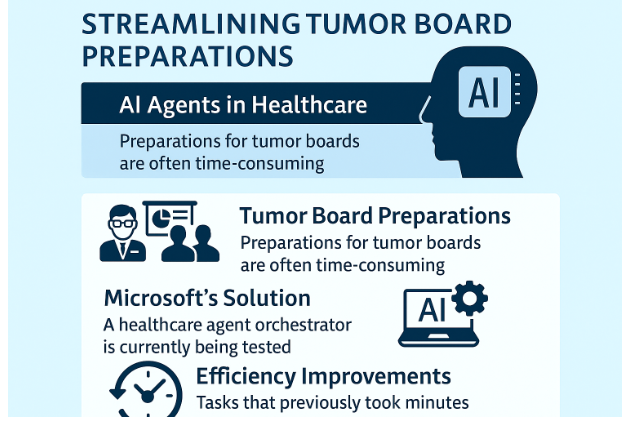Microsoft’s AI agents streamline tumor board preparations at Stanford Health Care, cutting hours of work into minutes and enhancing cancer care accuracy.
May 20, 2025 — A new generation of AI agents is set to revolutionize cancer care, as Microsoft and Stanford Health Care team up to streamline one of oncology’s most labor-intensive processes: tumor board preparation.
AI Enhancing Cancer Care Operations
Tumor boards bring together specialists to create personalized treatment plans. But preparing for these meetings is a major challenge, requiring hours of data collection from medical records, imaging, and literature.
Now, Microsoft’s Healthcare Agent Orchestrator—a tool within the Azure AI Foundry—is changing the game. Currently under testing at Stanford Health Care, the orchestrator creates autonomous AI agents that pull and summarize relevant data in a fraction of the time.
Stanford Sees 10x Efficiency Gains
Timothy Keyes, a data scientist at Stanford, reports that tasks which used to take hours now take just minutes. The AI agents assist in gathering clinician notes, insurance docs, and even interpreting radiology or pathology scans—all while identifying clinical trial matches.
“We’re seeing nearly tenfold improvements in speed,” Keyes said. “That translates directly into more time for patient care.”
AI and Microsoft 365 Copilot Integration
Clinicians can use natural language to interact with these agents inside tools like Microsoft Teams and Word—thanks to Microsoft 365 Copilot integration. The result? A more intuitive, streamlined workflow where AI handles admin-heavy tasks, while doctors focus on patients.
Improving Outcomes, Not Replacing Doctors
While the potential is immense, experts caution that AI is a support tool, not a replacement. Clinician oversight remains essential. These agents aim to augment decision-making, not automate it.
Looking Ahead
As Stanford continues testing, broader deployment is expected to follow. With thousands of patients served across its tumor boards, the benefits could reshape cancer treatment delivery nationwide.
📢 Subscribe for AI + Healthcare Insights:
Join our newsletter for weekly updates on AI, clinical tools, and tech shaping tomorrow’s hospitals.


